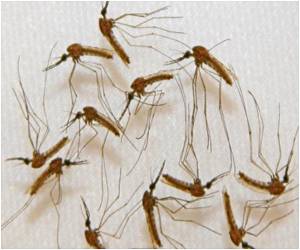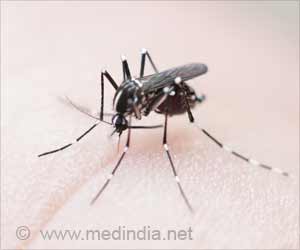British biotech firm Oxitec has altered the DNA of the Aedes aegypti mosquito to prevent it from spreading dengue fever which has hit Brazil harder than any other country this year.

The British biotech firm has altered the DNA of the Aedes aegypti mosquito to prevent it from spreading the potentially deadly virus, which has hit Brazil harder than any other country this year.
Oxitec's new factory in the Brazilian city of Campinas, outside Sao Paulo, is the first in the world to launch production of genetically modified (GM) mosquitoes to target dengue.
"This is the perfect environment for the Aedes aegypti mosquito, the main vector for dengue, to grow and reproduce," says Portuguese biologist Sofia Pinto, 32, as she leads a tour of the sweltering labs.
In one room, females mate with a handful of males in cages.
In another, larvae grow on dozens of trays. In a third, bottles full of GM males await release into the wild.
Advertisement
The company says if sufficient numbers of GM males are released into the wild, they will mate with females on a large enough scale to significantly reduce or even wipe out the dengue-carrying population.
Advertisement
Brazilian authorities have not yet given the go-ahead to sell the mosquitoes.
And genetic engineering skeptics have raised questions about the impact they could have on the ecosystem
Pinto downplayed those concerns, saying the Aedes aegypti is an invasive species that originated in Africa and was only introduced to Brazil in the modern era.
"It's an extremely urban mosquito and eliminating it from this environment will not have a major impact. It's not a pollinator nor a specific food source for other insects or animals," she said.
- 'Enormous burden' -
Developed in 2002, the mosquitoes have been tested in pilot projects in the Cayman Islands, the United States and Malaysia, as well as in the northeastern Brazilian state of Bahia.
But Brazil would be the first country to use them large-scale, or to allow commercial sales.
Oxitec's target customers are city governments here, which are on the front lines of the battle against dengue in Brazil.
The factory, which opened in July, can currently produce 500,000 mosquitoes per week, with a long-term potential capacity of up to two million.
Curbing dengue would be a public-health blessing for the South American country, which has registered 659,051 cases this year and 249 deaths -- by far the worst outbreak in the world.
There is no cure for the virus, and patients can only treat their symptoms -- a fever similar to a bad case of the flu with headaches, muscle and joint pain, vomiting and a rash.
In severe cases, patients can suffer bleeding, shock or death.
"Every epidemic is an enormous burden for public health centers, which collapse," said Brazilian infectious diseases specialist Esper Kallas of Sao Paulo's prestigious Sirio-Libanes Hospital.
He said GM mosquitoes were an "original way" to combat the disease, but that the jury was still out on the long-term results.
Source-AFP












